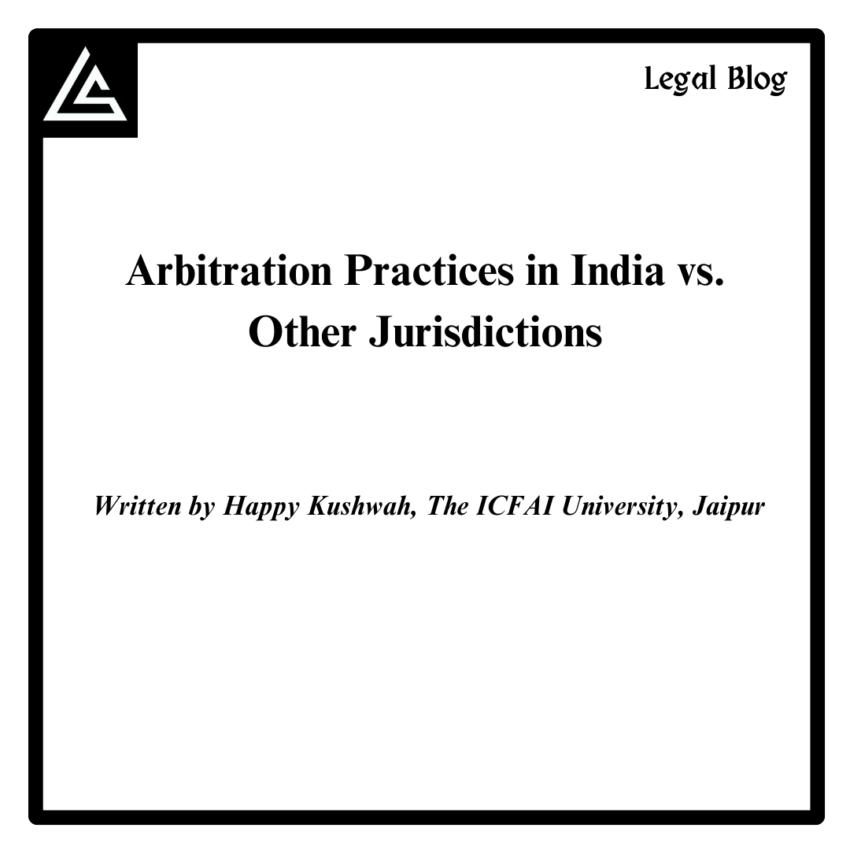Table of Contents
Introduction
Arbitration is increasingly becoming the preferred method for resolving commercial disputes globally due to its efficiency, flexibility, and confidentiality. While the fundamental principles of arbitration remain consistent, the practices and regulatory frameworks can vary significantly across jurisdictions. This blog compares the arbitration practices in India with those in other major jurisdictions, focusing on legislative frameworks, procedural differences, and enforcement mechanisms.
Arbitration Framework in India
India’s arbitration landscape is primarily governed by the Arbitration and Conciliation Act[1], which was modeled on the UNCITRAL Model Law on International Commercial Arbitration. This Act has undergone several amendments to make arbitration more efficient and attractive, with significant changes in 2015 and 2019.
Key Features:
- Institutional and Ad Hoc Arbitration: India recognizes both institutional and ad hoc arbitration, though the latter is more common. Efforts are underway to promote institutional arbitration through bodies like the Mumbai Centre for International Arbitration (MCIA)[2] and the Delhi International Arbitration Centre (DIAC).
- Interim Measures: Indian courts can grant interim measures before or during the arbitration proceedings, and arbitral tribunals have similar powers.
- Expedited Procedure: For disputes involving lower sums, parties can opt for an expedited procedure, which mandates the completion of arbitration within six months.
- Appointment of Arbitrators: The Supreme Court and High Courts can appoint arbitrators in case of a dispute between parties regarding the selection.
- Enforcement of Awards: Domestic awards are enforced under the Civil Procedure Code, while foreign awards are enforced under the New York Convention and the Geneva Convention, to which India is a signatory.
Comparative Analysis: India vs. Other Jurisdictions
- United States
The United States, with its federal system, has a dual approach to arbitration—domestic arbitration is governed by state laws, while international arbitration is governed by the Federal Arbitration Act (FAA)[3].
Key Differences:
- Judicial Intervention:S. courts generally adopt a pro-arbitration stance, with limited judicial intervention. The scope for setting aside arbitral awards is narrower compared to India.
- Discovery Process:S. arbitration allows for extensive discovery processes, unlike the more restrictive approach in India.
- Confidentiality: Confidentiality in arbitration is not as rigorously enforced in the U.S. as it is in India, unless specifically agreed upon by the parties.
- United Kingdom
The United Kingdom, particularly London, is a preferred arbitration hub governed by the Arbitration Act[4].
Key Differences:
- Autonomy and Flexibility: The UK provides greater autonomy to parties in determining procedural rules, making it more flexible.
- Costs and Duration: UK arbitration practices are known for being more cost-effective and timely, supported by robust institutional frameworks like the London Court of International Arbitration (LCIA)[5].
- Judicial Support: UK courts are highly supportive of arbitration, offering assistance without undue interference, thus maintaining the integrity of the arbitral process.
- Singapore
Singapore has rapidly emerged as a leading arbitration hub, governed by the International Arbitration Act[6], which incorporates the UNCITRAL Model Law[7].
Key Differences:
- Pro-Arbitration Environment: Singapore provides a highly supportive legal framework, with minimal judicial intervention and strong enforcement of arbitral awards.
- Institutional Support: The Singapore International Arbitration Centre (SIAC)[8] is renowned for its efficiency and effectiveness, providing comprehensive administrative support.
- Enforcement: Singapore’s approach to enforcement is robust, with the judiciary’s proactive role in supporting arbitration.
Challenges and Developments in Indian Arbitration
Despite significant strides, arbitration in India faces several challenges:
- Judicial Intervention: Excessive judicial intervention and delays in enforcement of arbitral awards remain concerns.
- Infrastructure: Lack of adequate institutional support and infrastructure compared to leading arbitration hubs.
- Costs: High costs associated with arbitration can be prohibitive for smaller businesses.
Recent Developments:
- Arbitration and Conciliation (Amendment) Act, 2019: Introduced provisions for establishing the Arbitration Council of India to promote institutional arbitration.
- New Delhi International Arbitration Centre (NDIAC): Established to create a world-class arbitration centre.
Conclusion
While India has made considerable progress in aligning its arbitration practices with international standards, challenges remain in the form of judicial intervention, infrastructure, and costs. Comparatively, jurisdictions like the United States, United Kingdom, and Singapore offer more streamlined and supportive environments for arbitration. Continued reforms and the promotion of institutional arbitration will be crucial for India to realize its potential as a global arbitration hub.
[1] Arbitration and Conciliation Act, 1996
[2] Mumbai Centre for International Arbitration (MCIA)
[3] Federal Arbitration Act, 1925 (United States)
[4] Arbitration Act, 1996(United Kingdom)
[5] London Court of International Arbitration (LCIA) Rules London Court of International Arbitration (LCIA) Rules
[6] International Arbitration Act (Singapore)
[7] UNCITRAL Model Law on International Commercial Arbitration
[8] Singapore International Arbitration Centre (SIAC) Rules
Author :- Happy Kushwah
The ICFAI University, Jaipur
share this post on

